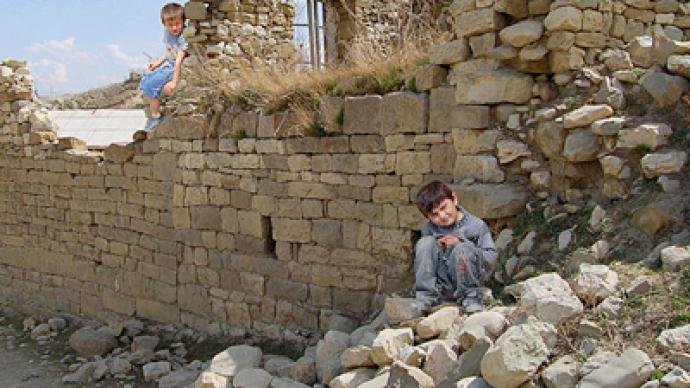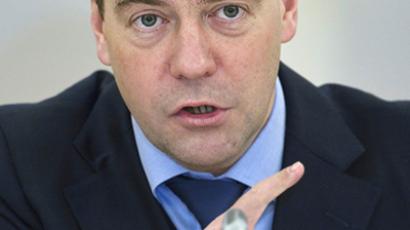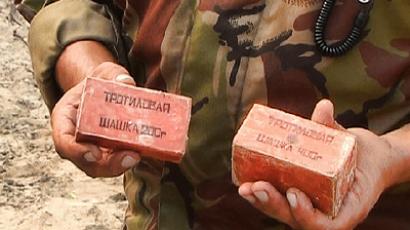Improved standard of living key to preventing terrorist recruitment – Dagestani president

The president of Dagestan, Magomedsalam Magomedov, believes the solution to the terrorist problem lies in improving the standard of living in the region. In an interview with RT, he says it would help prevent militants from boosting their ranks.
RT: Mr. President, thank you for finding time for this interview.Magomedsalam Magomedov: Thank you. It is my pleasure.RT: Recently, you have had a major success in liquidating the Dagestan chapter of the most-wanted militant network in Russia. Does this mean you are winning the war on terror?MM: Of course, this is a very important event. A big group of militants have been killed along with their leader, which is a great success. I think this is going to have a positive effect on the general stability throughout the republic. This is not the first rebel leader killed in the republic recently. This indicates that the performance of law enforcement bodies in the republic has improved, and military operations have become more accurate and effective. Some of the militants are unwilling to engage in a dialogue. They reject us when we urge them to lay down weapons and return to a peaceful life. Having committed so many murders and terrorist attacks, they now only understand the language of force. And, of course, such operations will continue until we have eliminated the terrorist underground in our republic. I mean those militants who are not willing to go back to peaceful life.This, however, is not the only method we use to fight terrorism. This is just the coercive aspect. We also need to strip extremists and terrorists of their base, stop the inflow of new recruits, and that requires solving a wide range of issues. RT: How can this be achieved? In fact, you’re saying exactly what the president’s representative in the North Caucasus, Aleksandr Khloponin, says: that the problem is not that there are a thousand militants, but that they keep refilling their ranks. How do you break this vicious cycle?MM: This is a more complex task that requires a systemic, comprehensive approach. Terrorism is a global phenomenon. It is not limited to our republic, or our region, and methods to fight it are well-known. First of all, we need to change the social and economic situation in the republic. We must restore the economy, create new jobs, and get young people involved in normal life. We need to give them education and jobs. If they are busy and if they have good prospects, they are unlikely to engage in criminal activities or join the militants. That’s the most important thing.RT: So it is the unfavorable social situation that feeds the militant movement?MM: Yes, exactly, this is exactly what is feeding the movement. The extremist ideologists are exploiting the problems we are currently facing. They are trying to convince the young that the current authority, the current regime is bad and unviable. They, it appears, want to live in a different state with totally different laws. Our task is to prove that we can develop successfully. To do that, we need to implement those major investment projects that we have started in our republic. There are many of them, and implementation of those can allow us to make the required new jobs and get the economy boost required to solve our key social problems. RT: Yes, the social problems. Modernization has become the buzzword in Russia. We are trying to create a 21st-century economy in a 21st-century state. What does modernization mean to Dagestan? Does it mean economic development of the region above all or also a war of ideologies that must be won? MM: You are right. This all must be done together, with the economy being the foundation of everything. The republic has been trailing behind the rest of the country in terms of both regional GDP and living standards. We have great shortage of kindergartens, schools, and cultural and sports venues. If we create this infrastructure, that alone will give us many opportunities for the youth to apply themselves. This is very important, but the matters of upbringing and ideology are just as essential. A generation of people has grown up who are not familiar with the Soviet-era traditions and values yet don’t have any new ideas or values to replace them. This vacuum is being filled by various radicals and extremists. This is our key concern. The fight for the minds and sympathies of young people is essential, and that fight is going on everywhere these days, especially in the media. Hostile forces have been very active on the internet, for example. We are trying to oppose them with our own ideology of peace and friendship. RT: Are you prepared to talk personally to terrorists? MM: Yes, I am. I am willing to talk to anyone if that helps ensure peace and well-being in the republic. We do that. There is a special commission whose main task is negotiating with militants and bringing back to peaceful life those who, by ignorance or by mistake, found themselves in their ranks. We take other actions to that effect, too. Last year, we held a congress of the peoples of Dagestan, attended by over 3000 people from all over the republic. We gave the floor to everyone, including members of the opposition, those who didn’t agree with us. All the attendants unanimously condemned terrorism and extremism and urged those who do it to get back to peaceful life.These are the real steps we are taking. I don’t advertise it but I also personally talk to those who can influence the situation, and I have lots of people working on that as well. In fact, we have brought over 30 people back to normal life through that commission already.RT: Like in Chechnya in 2006, you are ready to declare an amnesty for the militants who are not implicated in grave crimes. But how do you help them go back to normal life? It is clear that the public won’t accept them right away. And even their families regard them as enemies of the people. How can you help them integrate into normal society and start living a normal life again?MM: That’s the right kind of question, because coming back isn’t enough. A returning militant must have an occupation. We offer them an opportunity to get an education. They are young enough people. They should get an education and a normal profession that will later let them have a job and earn a living. And we are ready to give them jobs. For this purpose we maintain contacts with business people and employers. We will help them become educated and find an employment.RT: Considering the present-day level of corruption in law enforcement, where is the guarantee that they will secure safety for both the public and the militants that have laid down arms?MM: Amnesty is declared by the decree of the president of the Russian Federation. It’s not something that we do. We just help. We consider applications and help people go back to normal life. But we keep a measure of control over further proceedings. We won’t let some law enforcement agencies go back on our own promises. We do control that. Besides, there has been quite a shake-up in the top echelons of our law enforcement agencies. We have appointed new officers who are in a mood for normal work, not corruption-based work or persecutions motivated by their own private interests. No, I mean constructive work implying that they are ready to protect a person, to help him, and so on. Personally I am doing my best not to let Dagestanis face some persecution or unlawful acts on the part of the law enforcement agencies. These agencies are also doing their best to work in a new way. I think we’ll be able to guarantee the performance of all the obligations we’ve assumed.RT:Is there some international organization that finances the terrorist underground in Dagestan?MM: Of course, there is. I can’t name any organizations right now. But in our republic, we’ve arrested quite a few emissaries of all kinds of organizations, Al-Qaeda and others. People from many countries used to come to Dagestan. Today, thank God, the situation is more under control. The borders are more reliably protected. But nevertheless in some cases they are able to smuggle money and weapons in. It’s a type of work that we should go on with. We must cut their supply lines. But, unfortunately, the terrorists also have domestic sources of funding. They have no shame. They act like common gangsters or extortionists. They extort money from business people. And this is dangerous. This hampers the development of business and the economy. We see this as the biggest obstacle to our economic growth.RT: How safe are people in the mountains? As I understand, Umarov’s men recently attacked a road-block. How safe is it for civilians in the mountains?MM: It is just in some districts, or areas, that the situation is dangerous. But most of Dagestan is a quiet and safe place, where people live and work, knowing no such problems. The law enforcement agencies function normally in the entire territory of the republic. We don’t have militant-controlled areas at all. Militants can just launch isolated attacks or engage in sabotage or terrorism. But you won’t find them publicly or legally in control anywhere. This kind of situation is out of the question. It’s we who control the republic. RT: I know the mayor of Makhachkala has survived 18 attempts on his life. How safe do you feel in Dagestan as its president?MM: Those attempts took place long ago. There have been no attempts on the mayor’s life lately. As for me, I feel safe, as do the rest of the Dagestanis. Of course, I do have a need for special security measures and these measures are practiced. It’s our life, regrettably. But a much more important thing for me is the safety of our citizens, the citizens of Dagestan as a whole. My heart will be at peace when we can guarantee security to all Dagestanis.RT: Mr. President, when you came to power after a long period of rule by Mr. Aliyev, you were looked upon as a kind of Dagestani Obama. People associated with the young president their hopes for radical changes. Are you able, in your view, to secure these changes that both Dagestan and the rest of Russia need so much?MM: A lot must be done. What we have already done is just the beginning. I agree. Changes will be made, because otherwise we won’t get anywhere and we will always remain a backward and problem-ridden region. We, on the contrary, want to be an advanced, prosperous and peaceful region. New things are taking root. We have held elections to the People’s Assembly. More than half of the legislators are new people. The Public Chamber has many new members as well, more than 50 per cent of them. The change is there and it is going to continue. But it takes time to assure a mass-scale inflow of new people. Firstly, we don’t have that many well-trained people who would be ready to come and start working immediately in the executive branch or in the legislature. It’s a problem – how we find our personnel. Today I’ve seen many able people. So, we will be inviting them.On the other hand, I don’t think we should be too quick when conducting reforms in Dagestan. We have a special situation, a special mindset. We have many ethnic groups in our republic, and we should take into account the interests of all the ethnic groups. This means we need to be careful and considerate when dealing with personnel decisions, when hiring or firing people. But anyway it is not a motive for tarrying. We need change and we will make it come.RT: What about football? I know you have bought Roberto Carlos, and in Chechnya next door, Gullit has been invited to coach. Do you want to make the North Caucasus a world football center?MM: I can’t speak for the entire North Caucasus. I am happy that our own team, Anzhi, has a new owner, who is very active in rebuilding the team. He is a major investor and has invited many famous people. I mean Roberto Carlos for one, who plays for our team. It’s a good thing, of course. I hope for victories and they are coming. Our young people root for the club with great pleasure. They are getting more interested in football and sports in general. And this is a good alternative to all those negative things that some are willing to foist upon us. This is why the team’s success is a success for the republic as a whole. RT: Do you play football yourself?MM: No, I don’t. I do other sports now.RT: Thank you!














